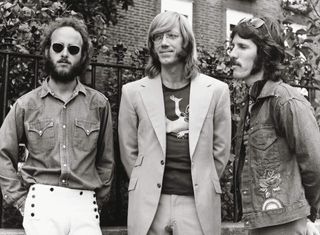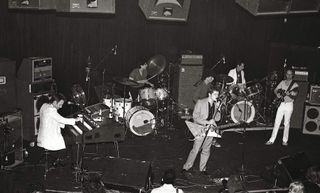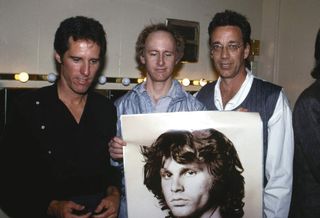The lizard king is useless, lengthy dwell The Doorways. It’s August 1971, barely a month after Jim Morrison was discovered useless in a tub in Paris, and his surviving bandmates in The Doorways are placing the ending touches to their first album with out him. You would possibly politely name this an act of professionalism. In much less charitable phrases it may simply seem plain chilly.
Unimaginable because it may appear, at the moment there hadn’t been an entire lot of debate about whether or not or to not stick with it. “Of all of the mysteries surrounding The Doorways, the one which possibly confounds individuals probably the most is why we thought we may nonetheless be a band after Jim died,” guitarist Robby Krieger wrote in his 2021 memoir Set The Night time On Hearth. “It appears so ridiculous now, however there was some logic to it.”
To be truthful, there was greater than slightly logic to it. Krieger, keyboard participant Ray Manzarek and dummer John Densmore had been writing and getting ready songs for the following Doorways album, whereas Morrison vacationed in Paris. In response to Manzarek, Morrison had even rehearsed quite a few new Doorways songs previous to leaving for France. His non-return wasn’t considered as fairly the inventive disaster it appeared. “On the time it made sense to jot down songs,” Krieger reasoned. “It made sense to file. Our label was behind us all the best way…Why not maintain it going?”
Looking back, the trio conceded that they need to’ve allowed a interval of mourning. However, as Densmore rationalised in his personal biography Riders On The Storm: “We have been so fired as much as go on earlier than Jim checked out that we didn’t actually acknowledge his demise and grieve.”
The speedy fruit of their labour was the album Different Voices. Not one of the band significantly entertained the thought of discovering a alternative for Morrison, in order that they determined amongst themselves that Manzarek and Krieger would share lead vocals. Manzarek a minimum of had kind on this division, having sung in pre-Doorways outfit Rick & The Ravens. The remainder of the set-up was just about enterprise as typical. Common producer Bruce Botnick was on the controls, and recording happened within the acquainted surrounds of The Doorways Workshop, website of the L.A. Lady classes, in Hollywood.
However the big Morrison-sized gap, Different Voices’ different main distinction was its workforce of bassists. Jerry Scheff returned from L.A. Lady, however shared the bass enjoying with Jack Conrad, Wolfgang Melz and Ray Neapolitan. The songs, at greatest, have been serviceable. At worst, The Doorways gave the impression of a workaday bar band.
Krieger’s Selection Is The Spice Of Life, for instance, rapidly lapses into deadweight boogie, hardly enlivened by trite lyrics: ‘All these fairly girls with nothing to do/C’mon and assist me attempt to discover one thing new.’ I’m Sexy, I’m Stoned sounds simply as unhealthy as its title suggests; Down On The Farm – supposedly rejected by Morrison throughout the L.A. Lady classes – can’t appear to determine whether or not it needs to be Canned Warmth or a rustic pastiche.
There are some worthy moments, nonetheless. Tightrope Trip rattles alongside like prime Stones. Lyrically it feels aimed straight on the band’s departed frontman, appearing as each tribute and cautionary story. There are allusions to isolation, insanity and courting hazard, whereas the ultimate verse attracts comparability to a different doomed younger soul: ‘We’re by your facet, however you’re on their own/ Like a Rolling Stone, like Brian Jones.’
Cling On To Your Life finds The Doorways finding their traditional groove, underpinned by Melz’s sprightly funk bass line. The monitor accelerates, in the end racing headlong right into a manic jam. The epic Ships With Sails is equally hanging, not least for an prolonged instrumental passage that finds the trio really impressed, negotiating folk-rock and jazz, and topped by a fantastic, open-ended Manzarek solo. It’s telling that Different Voices’ alternative moments are typically with out vocals.
Launched in late October ’71, the album couldn’t compete with its platinum-shifting predecessors, however peaked, pretty respectably, simply exterior the Billboard High 30. Elektra Information boss Jac Holzman introduced gross sales of 300,000, which, bolstered by a profitable US tour that included sell-out dates at Carnegie Corridor and Hollywood Palladium, was sufficient to warrant extra studio time.
“[Jac] wasn’t naïve sufficient to assume a Morrison-less Doorways album would break any gross sales data, however he stood by us like he at all times had,” famous Krieger. “His timeless help was, for higher or worse, one of many huge causes we needed to the heart to press ahead.”
For higher or worse, certainly. The trio wasted no time in recording a follow-up. This time The Doorways opted to provide the album with out Botnick, and introduced within the extremely revered Henry Lewy – greatest identified for his work with Joni Mitchell and Crosby, Stills & Nash – as engineer. In flip, Lewy enlisted a clutch of session gamers that included one other spherical of visitor bassists, percussionist Bobbye Corridor, jazz sax supremo Charles Lloyd and backing singers Clydie King and Venetta Fields. The surroundings modified too, albeit none too radically, The Doorways switching base from the Workshop to A&M Studios a few miles away on N. LaBrea Avenue.
The ensuing Full Circle didn’t veer very removed from its speedy predecessor. Once more, Manzarek and Krieger cut up lead vocals. And whereas it’s patently unfair to match both to Morrison, each males’s singing skills are restricted, nonetheless a lot spirit they attempt to inject. They’re hardly saved by the music, both. Get Up And Dance, with The Flying Burrito Brothers’ Chris Ethridge on bass, rapidly descends right into a generic chug. ‘Golden days!’ goes the lyric, as if making an attempt to persuade themselves that they’re onto factor, regardless of overwhelming proof on the contrary.
Hardwood Ground doesn’t assist The Doorways’ quickly sliding fame both. Right here, Manzarek riffs away on rinky-dink piano like he’s enjoying for change within the saloon of some Western theme park. On Good Rockin’, a canopy of Roy Brown’s jump-blues normal made well-known by Elvis Presley as Good Rockin’ Tonight, he goes all Jerry Lee Lewis on piano whereas Krieger units about channelling Scotty Moore. The much less mentioned for 4 Billion Souls’ excruciating name for world peace, the higher.

But Full Circle additionally deserves credit score for daring to experiment slightly. The Mosquito, the album’s sole three-way co-write, presents a playful and surprising burst of mariachi, full with recurring hook, handclaps and celebration atmosphere. It was impressed by a vacation that Krieger and his spouse took to Baja in Mexico, the place they have been serenaded one night by a bunch of native musicians.
“They’d a track a couple of mosquito that I needed to be taught,” the guitarist recalled later. “However once I bought residence I couldn’t fairly bear in mind it, so I wrote my very own mariachi-sounding tune with easy Spanish lyrics.”
The Doorways lean into it with such gusto – swirling organ runs, a Densmore drum break, jazzy outro – you can nearly forgive Krieger for rhyming ‘mosquito’ with ‘burrito’.
Full Circle packs a pair extra surprises in Verdilac and The Piano Hen. The previous takes a detour into New Orleans jazz-funk, dominated by Manzarek’s organ enjoying and Charles Lloyd’s tenor sax. The Piano Hen follows in related vein, led out by Krieger’s gentle, rhythmic guitar determine. There’s a free, carefree air to all of it, with Lloyd’s jazz flute excessive within the combine, maybe suggesting an surprising means out of The Doorways’ post-Morrison malaise.
Launched in August ’72, Full Circle fared worse than Different Voices, peaking at No.68 within the States. Each albums hardly registered in any respect in different international locations, regardless of the novelty success of The Mosquito in random components of Europe, the place it grew to become a High 20 single. It’s instructive to notice that Krieger dispenses with each albums inside two pages of his memoir. Densmore is much more dismissive in Riders On The Storm, washing his palms of each in simply a few paragraphs.

The Doorways have been nonetheless a good dwell draw, by way of. A lot in order that, following their subsequent tour of Europe, they flew to London in early 1973, with the categorical goal of lastly bringing in a brand new frontman. They weren’t after a Morrison copyist. As an alternative, as Krieger put it, they needed “somebody who may theoretically take us in a daring new path”.
Paul McCartney, Paul Rodgers and Joe Cocker have been among the many names brainstormed in The Doorways’ lodge room. Opposite to hearsay, Morrison disciple Iggy Pop was by no means in rivalry. A front-runner quickly emerged within the form of Howard Werth, who’d not too long ago forsaken art-rockers Viewers for a solo profession. “I got here on the scene as a result of Jac Holzman needed to make Viewers the brand new band on his Elektra label,” Werth informed Basic Rock in 2014. “However after we broke up he determined to attempt to put me and The Doorways collectively.”
Werth had already began work on his first solo file, King Sensible, however agreed to participate in rehearsals with Krieger, Manzarek and Densmore in West London. “These rehearsals have been fairly sturdy and highly effective,” he recalled. “We have been simply ploughing by way of. It wasn’t a matter of them all of a sudden turning spherical and going: ‘Oh, that’s good’ or ‘You’re the one’. We have been simply having fun with it and ready for the scenario to occur or not. And, because it turned out, it didn’t.”

Manzarek duly flew again residence together with his spouse Dorothy, who was pregnant and depressing in England. However not earlier than he had rowed with Krieger and Densmore over the musical path of the band. In easy phrases, Manzarek needed extra jazz, whereas the opposite two have been intent on pursuing rock.
“It was simply time to place The Doorways to mattress,” Manzarek defined to Melody Maker later that 12 months. “Some issues can go on for a very long time and others can’t. And The Doorways with out Morrison weren’t The Doorways, have been they?”
Krieger and Densmore stayed on within the UK and fashioned the Butts Band with singer Jess Roden and others. The group lasted by way of a serious line-up change, relocation to Los Angeles and two so-so studio albums. It was, mentioned Krieger, “our first lesson in attempting to flee the shadow of the previous”.
In the meantime, Manzarek launched a few ill-judged solo albums, briefly rehearsed with Iggy Pop, and in 1977 began his personal band, Nite Metropolis. No one purchased these data both. The shadow of the previous, it appeared, was longer than any of them imagined.
Someday in 1977, Krieger was sorting by way of some previous bins when he occurred upon a gift that Morrison had given him previous to leaving for Paris. Morrison had self-published a e-book of poetry, sure in purple leather-based and gold-stamped with the title An American Prayer. Leafing by way of the slim assortment, the guitarist started considering.
Morrison had gone into the studio to file some poetry in February 1969. The thought, hatched between him and Jac Holzman, was to launch a spoken-word album for Elektra. The singer returned to Village Recorders in LA on December 8, 1970 – his twenty seventh birthday. Producer John Haeny picked up Morrison on the best way, stopping off at a liquor retailer to purchase him a bottle of Previous Bushmills Irish whiskey as a present. There was methodology in his tactic. As Haeny later defined: “[Ex-Doors producer] Paul Rothchild informed me that Irish whiskey was the important thing that unlocked the door to the room the place Jim saved the crazed Irish poet.”
Within the early summer season of 1971, at Morrison’s request Haeny had meant to journey to Paris to file the album in earnest. Nevertheless it wasn’t to be. The producer ended up sitting on the session tapes for the period, till Krieger referred to as a number of years later. Haeny duly invited the three surviving Doorways as much as his home in Laurel Canyon to have a hearken to the recordings.
“When Jim’s voice got here out of the audio system, I immediately heard lifts and falls,” Krieger recalled in Set The Night time On Hearth. “Rhythms and hints of melodies. Jim had a naturally musical means of talking, and it instantly sparked concepts in my head for guitar licks and chord constructions.”
With Haeny overseeing the venture, Krieger, Manzarek and Densmore as soon as once more set in regards to the activity of placing Morrison’s phrases to music.
Blues appeared the apparent start line as a textural backdrop, completely illustrated on the sultry, bruised Angels And Sailors. However The Doorways opted to combine it up, guided by the various cadences and tones in Morrison’s speech. Curses, Invocations pivots round a discreet jazz riff; American Night time is all clangy dissonance; Ghost Tune dives into fusionist funk, with Manzarek vamping away whereas visitor Bob Glaub punctuates issues with snapping bass.
Different components are drawn from audio collage. There’s dialogue from Morrison’s experimental movie HWY: An American Pastoral, bits of jam classes, excerpts from Riders On The Storm and such. An unruly dwell model of Roadhouse Blues is spliced from two Doorways gigs in New York and Detroit from 1970. A Feast Of Associates is about to a brand new association of classical piece Adagio In G Minor, which the band initially recorded throughout classes for The Smooth Parade. “Jim had at all times cherished the recording,” justified Krieger, “so we thought it will be becoming to revive the track for him.”

Thematically, An American Prayer was each self-glorifying and conceptual. The Doorways cut up the poems into 5 free sections, overlaying Morrison’s formative childhood, highschool years, poetic ambitions, Doorways fame and, as Manzarek later put it, “a last summation, in a means, of the person’s complete life and philosophy”.
Launched in November 1978, the album did a lot to therapeutic massage the parable. Daybreak’s Freeway featured the oftrepeated story of how the Morrison household – with four-year-old Jim within the again – got here throughout a truckload of Native Individuals scattered on a desert freeway, bleeding to demise after an accident. Wanting again, he believes that ‘the souls of the ghosts of these useless Indians, possibly one or two of ’em, have been simply working round freaking out/And simply leaped into my soul.’ Right here was Morrison portrayed as insurgent poet and shaman, rock’s broody leather-based Dionysus, mojo risin’ from the grave.
By no means thoughts the blended evaluations, An American Prayer went platinum, turning into the biggest-selling spoken-word album in historical past on the time. Its success set into movement a Morrison revival that rapidly morphed into cultural fixation. Inside six months, Francis Ford Coppola was utilizing The Doorways’ The Finish to presage the dread and horror of Apocalypse Now, Morrison’s soul-purging nightmare writ giant over American involvement in Vietnam.
In 1980, No One Right here Will get Out Alive, by Jerry Hopkins and Danny Sugerman, grew to become the primary Morrison biography. Criticised for Sugerman’s implication that the singer could have faked his personal demise, its sensationalism fed straight into the rising legend.
Elektra sensed a possibility too. A reissue of The Doorways’ debut album was a success once more. A hurriedly assembled ‘biggest hits’ assortment went multi-platinum. By September 1981, Rolling Stone had Morrison splashed on its cowl, 10 years after his demise, underneath the editorial: “He’s scorching, he’s attractive and he’s useless!” It turned out that Morrison had already referred to as it within the phrases of An American Prayer: “We dwell, we die and demise not ends it.”
